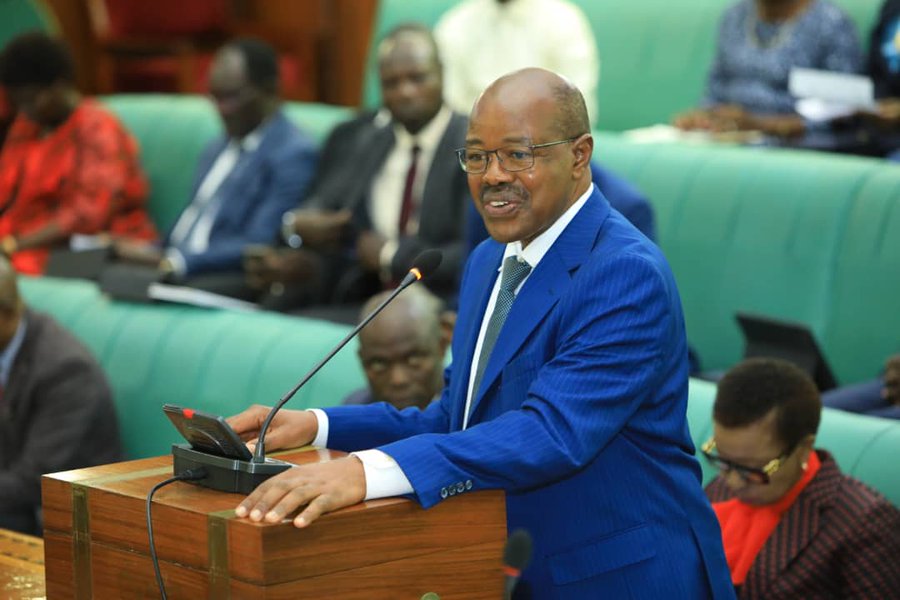Uganda’s economy is on the move, showing positive signs across multiple sectors. From agriculture to industry and beyond, various factors are driving growth both at home and on the global stage. In this update, we take a closer look at the latest trends and developments shaping Uganda’s economic landscape. From GDP growth and inflation to budget allocations and expenditure, we’ll keep you informed about the state of Uganda’s economy and its implications for everyone involved. Below is the Budget in detail:
” BPD/103/155/01
12th April 2024
PRESS RELEASE ON QUARTER FOUR EXPENDITURE RELEASES FY 2023/24
- I wish to welcome the media and other stakeholders to this meeting whose objective is to brief the media on the State of the Economy and the Fourth Quarter releases for this Financial Year.
- MACRO ECONOMIC PERFORMANCE FOR FY 2023/24 TO DATE
Economic Growth
- The economy remains on track to achieving 6.0% growth projected for this Financial Year. In the first half of this year, economic activity remained on a recovery path, partly supported by continued implementation of growth-enhancing government programs and an increase in private sector activity. The economy registered GDP growth of 5.3% and 5.5% in the first and second quarter of FY 2023/24, respectively. The key growth drivers were higher production in the industry sector, growth in agriculture, forestry and fishing sector, growth in services as well as increase in household consumption, investments, and exports.
- The agriculture sector is expected to grow by 6.0% this financial year from 4.8% the previous financial year mainly driven by increased production of food crops, cash crops, livestock and fish. This is being driven by continued government intervention in provision of quality seedlings, extension services, water for production and affordable credit through the PDM, and better weather conditions. Exports volumes of key food crops like maize have grown by 79%, and other exports of fruits and vegetables (134%), other pulses (11%), coffee (10%), cotton (56%), tobacco (4%), cocoa beans (79%) have also registered growth for the first 7 months ending January 2024 compared to the same period last year.
- In industry, there is continued recovery in manufacturing and construction activities as inflation continues to stabilize and remain below the central bank target. Low inflation is expected to support recovery in consumption and investments and to support robust growth in trade, communication, hotel and tourism services as well as continued recovery in transport and financial services.
- The high frequency indicators of economic activity show an increase in economic activity and better business sentiments within the Financial Year 2023/24. In the third quarter, the Purchasing Managers Index (PMI) averaged 51.67 remaining above the 50-mark threshold. The CIEA also remained on a positive upward trend. Although the PMI showed a slight decline in private sector activity in March 2024, the Business Tendency Index (BTI), was recorded at 55.54 in March 2024 implying that investors and businessmen have confidence and positive sentiments about the economy.
- It is therefore projected that the size of the economy is to grow from Shs184.895 trillion (49.251billion) in Financial Year 2022/23 to Shs204.9 trillion (USD55 billion) in financial year 2023/24.
Inflation
- Annual headline inflation averaged 2.9% in the first half of FY 2023/24 down from 8.0% in the second half of FY 2022/23 due to improved food supply alongside supportive monetary and fiscal policies. In March, Annual headline inflation was recorded at 3.3% down from 3.4% in February 2024.
Exchange Rate
- The exchange rate has also been stable although the recent issuance of Government Treasury bonds in Kenya with high interest rates has recently caused some temporary weakening of the shilling against the US dollar by 1.8 percent between January and February 2024. This is because some portfolio investors in Government securities opted to exit Uganda for Kenya where the yields were higher, thereby reducing the supply of US Dollars in the market. However, this was a temporary shock that has already started to abate. The shilling traded at an average mid-rate of Shs 3895.8/USD in March 2024 from Shs 3873.6/USD, implying a depreciation of 0.6%.
External Sector
- In the external sector, tourism inflows, foreign direct investment and remittances remain strong, increasing by 29.5 percent, 21.3 percent, and 13.7 percent respectively in the first quarter of this financial year 2023/24 compared to the same quarter of FY 2022/2023. Total export receipts remain strong registering growth of 68.5% in the first half of 2023/24 compared to the first half of 2022/23.
- Going forward, the economy is projected to grow at 6.4% in FY 2024/25 mainly driven by; growth in services, agriculture and industry output, supported by increase in aggregate demand and investments; efficient implementation of growth supportive government programs and infrastructure; increased Oil & Gas sector activities; tourism, as well as growth in regional trade and exports.
- APPROVED BUDGET AND RELEASES FOR Q1-Q3 FOR FY 2023/2024
- The Approved Budget for Financial Year 2023/24 amounts to Shs 52.736 trillion summarized in the table below.
Table 1: Q1-Q3 Budget Performance for FY 2023/24.
- From the table above, the GOU Budget less Debt, External Financing and Local Revenue amounts to Shs 25.249 trillion, and of this amount, Shs 20.877 trillion (82.7%) has been released for Q1-Q3 for this financial year. However, apart from the GoU Budget, it is important to note the performance of External Financing at 77%.
- HIGHLIGHTS OF EXPENDITURE LIMITS FOR THE FOURTH QUARTER OF FY 2023/24
- This Quarter (April-June), Shs 7,687 trillion has been released representing 30.4% of the GoU Budget as follows:
| Category | Budget | Q4 | % |
| Wage | 7,289.97 | 1,872.70 | 25.7% |
| Non Wage | 11,636.07 | 3,347.00 | 28.8% |
| GOU Devt | 6,108.15 | 2,457.15 | 40.2% |
| Arrears | 215.79 | 10.45 | 4.8% |
| Total GoU | 25,249.98 | 7,687.31 | 30.4% |
- This will bring the total GoU release for FY 2023/24 to Shs 28.564 trillion (113.1% of the approved Budget and 98.4% of the approved Budget).
- The key highlights of the release per category are as follows:
Wages and Salaries
- Shs 1.872 trillion to cater for wages and salaries across Government;
Non Wage Recurrent
- Shs 529.7 billion for Parish the Development Model (PDM). This makes the total release to PDM to Shs 1.059 trillion;
- Shs 312.291 billion for Pension and Gratuity.
- Shs 239.91 billion to Local Governments including Education Capitation Grants (Shs. 110.9 billion) to cater for Term 11 of the school year;
- Shs 189.74 billion to Uganda Road Fund for maintenance of roads; This ensures 100% of releases to Road Fund i.e Shs 428.757 billion;
- Shs 90.211 billion to National Medical Stores for purchase of essential drugs and medicines. This ensures 100% of releases to NMS i.e Shs 560.967 billion;
- Health institutions operational funds have been released for
- Ministry of Health – Shs 37.067 billion;
- Regional Referral Hospitals – Shs 21.322 billion;
- Mulago – Shs 11.276 billion;
- Butabika – Shs 2.172 billion;
- Uganda Cancer Institute – Shs 14.43 billion;
- Uganda Heart Institute – Shs 3.79 billion;
- Uganda Blood Transfusion Services – Shs 1.455 billion;
- Uganda Virus Research Institute – Shs 1.405 billion.
- Security institutions:
- Ministry of Defense and Veteran Affairs – Shs 312.49 billion;
- Uganda Police Force- Shs 61.063 billion;
- Uganda Prisons Services – Shs 72.318 billion;
- ISO and ESO – Shs 52.927 billion.
- Statutory Votes:
- Parliament – Shs 156.141 billion;
- Judiciary – Shs 31.419 billion;
- Auditor General – Shs 19.52 billion;
- Science Technology and Innovation Shs 106.7 billion;
GoU Development
- Ministry of Defense and Veteran Affairs – Shs 629 billion;
- UNRA- Shs 364.807 billion for road construction;
- MoWT – Shs 146.141 billion which includes funds for SGR;
- Outstanding obligations under MoWE – Shs 133.46 billion;
- Capital expenditure under MEMD – Shs 152.78 billion;
- Ministry of Agriculture, Animal Industry and Fisheries- Shs 42.7 billion;
- Health Institutions:
- Shs 12.5 billion for Cancer Institute;
- Shs 2.075 billion for Heart Institute; and
- Shs 10.487 billion for Regional Referral hospitals.
- Kampala Capital City Authority – Shs 29.374 billion under GOU development expenditure including funds for road maintenance and drainage.
- Please note that Shs 88 billion for Local Government Development has been released for Road Maintenance and equates to Shs 500 million per Local Government. This will ensure that Governments commitment of Shs 1 billion for road works, to each Local Government has been met for this Financial Year.
WAGE, PENSION AND GRATUITY BUDGET AND EXECUTION KEY ISSUES FOR FY 2024/25
- This Ministry requested the Office of the Auditor General to undertake special audit of the salary and pension payrolls to address the persistent shortfalls in salary, pension and gratuity. The special audit of the salary payroll was concluded and the findings informed the wage allocation for FY 2024/25. During the audit, there are staff who were not fully verified and the Auditor General recommended that the Ministry of Public Service completes the verification process.
- On account of the harmonized wage requirements, the wage bill for FY2024/25is Shs 7.513 trillion.This includes staff who had been recruited but not accessed onto the payroll. The preliminary report from the Ministry of Public in respect of the ongoing verifications indicates that some Accounting Officers have been recruiting staff over and above the approved wage bill for this Financial Year and went ahead to access them into the payroll causing shortfalls again and in total disregard of our circulars.
- I have the list of Votes that have undertaken unauthorized recruitment and I will take appropriate action against the Accounting Officers and their technical staff who recruited against the freeze put in place.
- Going forward, the following are the measures to be implemented to ensure prudent management of the payroll:
- The Ministry of Public Service shall close the window for accessing new staff on the payroll system and any new records added shall require prior approval by the Ministry of Public Service upon confirmation of adequacy of the wage bill;
- District Service Commissions must ensure that Accounting Officers support their submissions with evidence of authorization of the recruitment from Ministry of Public Service;
- Any shortfalls arising from Accounting Officer recruiting staff without authority by the Ministry of Public Service shall be deducted from the unconditional Non-wage grant otherwise Local Revenue will address the resultant funding gap;
- Any Officer found culpable of any unprofessional conduct in the management of the recruitment process specifically at wage bill analysis and access to payroll stages shall be held personally liable.
CONCLUSION
- In conclusion, I would like to highlight the following:
- All Accounting Officers must ensure that they pay wages, salaries, pensions and gratuity by the 28th of every month.
- Accounting Officers must prioritize payment of service providers on time and avoid accumulation of arrears.
- There should be display of the payrolls for salaries and monthly pensions on government institutions and cost centres (schools, health centres, departments etc.) notice boards every month.
- Accounting officers must ensure timely submission of performance reports and accountability.
- Given that this is the Fourth Quarter, Accounting Officers must ensure that priority is given to meeting any outstanding obligations and should not enter commitments that will lead to accumulation of domestic arrears at the end of the Financial Year. Failure to adhere to this will negatively impact on subsequent budget ceilings of MDAs that accumulate arrears.
- Once again, I wish to thank the Press and Civil Society for supporting our budget transparency initiative. I urge you to make use of our website www.budget.finance.go.ug where we post more detailed information. You may also call our Budget Call Centre on 0800 229 229 for any information on the Budget.
Ramathan Ggoobi
PERMANENT SECRETARY/ SECRETARY TO TREASURY
“























